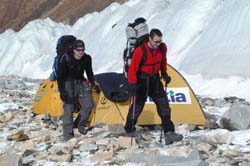K2 WINTER POLISH EXPEDITION
NEWS
10 January, 2003
TAKING REST
Together with Jacek Berbeka, Krzysztof Wielicki, the head of the expedition, has installed fixed ropes on another 250 m of K2's Northern Pillar above camp I (5950 m). All in all, the alpinists have already installed over one and a half kilometers of fixed ropes securing the climbing and the descent down the ridge. One of the young participants has shown symptoms of height sickness. He was taken down to the Chinese base.
|
Photo by © Monika Rogozinska |
The expedition physician accompanied the sick man during his descent from the Italian base on the K2 glacier. "This is almost a textbook example, because the height sickness afflicted the youngest participant", said Dr. Roman Mazik. "According to what we know, it's people in their twenties who have the greatest difficulties to adapt their body to the conditions in great heights. During the climb to the intermediate base, he experienced a shortened and shallow breath, stomach and intestine problems, loss of strength. These symptoms did not recede during rest. I took the decision to descend to the Chinese base. Descending over 600 m made the symptoms of the mountain sickness almost completely disappear. Our friend must begin his acclimatization from anew, which will take some time. This isn't dangerous for his life or health." |
The young, ambitious mountaineer is very discouraged and makes the impression as if he was ashamed for what has happened. That is totally unnecessary, as there is no way of telling at sea level how the body will react to height and lack of oxygen. The test can be taken only during the expedition. It does not mean that the body will always react badly to height, either.
Today, Krzysztof Wielicki, Jerzy Natkanski and Jacek Berbeka stayed in camp I for the night. We do not know the temperature there, since the thermometer froze. At the Chinese base (3900 m), there were minus 22 deg. C at night, at the upper base (5100 m) minus 30 deg. C. In the morning, the three alpinists left the camp and installed fixed ropes on another 250 m of K2's Northern Pillar. All in all, the alpinists have installed 1550 m of ropes so far. There are still 4 km to go. For the next few days, the activities on the ridge will be stopped. Almost all expedition participants are descending or have already descended to the Chinese base to rest for a day, to have a wash, to eat their fill, and then to help with the transportation of the heavy equipment of the TV-team to the K2 glacier, including the whole electronics and power supply, which will enable direct communication with the whole world from the glacier. This will enable us to watch the actions of the alpinists on the Pillar by ourselves and directly pass on any information about them. The Chinese base will be eliminated.
Denis Urubko and Vassiliy Pivtsow, who established camp I, have descended down here. "The setting of this camp was the conclusion of the common work of all colleagues, which is quite normal under these circumstances, a work that took five days to complete", says Denis Urubko. "As it turned out, I was not alone with Vassiliy in the morning. A big raven visited us."
In order to explain how one spends the night at camp I, where the low temperature causes the steam being exhaled to immediately freeze in the tent and fall down on the person asleep, melting behind the collar, Denis suggests an experiment. "You have to get up at 4 o'clock in the morning", he says, "open the fridge, scrape of the snow from the ice box, add a handful of ice, and then, after returning to bed, put it behind the collar of your pyjamas."
Denis Urubko is 29 years old. He was born in Russia, in northern Caucasus. Presently he lives in the capital of Kazakhstan. He reached the summits of 6 8000ers without using an oxygen cylinder: Mount Everest, Kangchenjunga, Lhotse, Gasherbrum I and II, Shisha Pangma. He likes speed ascents: from the base to the summit and back. Two years ago, together with Vassiliy Pivtsov, he reached the summit of Gasherbrum II (8035 m). (Denis made the speed ascent: from a base (5800 m) to the top within 7.5 hours, then descended in 4 hours.) Exactly one week earlier, they reached the summit of Gasherbrum I (8068 m).
Urubko has been regarded to be the best alpinist in Kazakhstan for four consecutive years, beating speed records in mountaineering. He climbed the 7000er Khan Tengri in 12 hours, which usually takes four days to climb. He reached the summit of Lenin's Peak (7134 m) in the same time.
One is permitted to wear the title of a Snow Leopard after climbing five 7000ers. Urubko climbed 11. Very often, he climbs solo. He does not like big expeditions, where it is necessary to install fixed ropes, to set up many camps; he does not like supplementary oxygen.
I asked him why he decided to participate in the K2 expedition, which requires the arduous installation of fixed ropes, setting up camps, all those things he usually avoids. "K2 is a fantastic, difficult mountain, and the winter is a test for every alpinist in the world", says Denis. "It teaches you humility and patience. Chill, hunger and suffering have no meaning compared to the life challenge in the form of setting oneself against the Mountain of Mountains at this time of year."
Monika Rogozinska From the Chinese base (3900 m), 01.08.03
